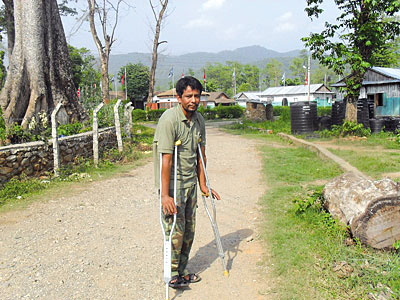 EKAL SILWAL |
'A man who lost his leg during the conflict, who does not know the whereabouts of his missing family, is wandering on the street.' This is the caption of a drawing by Sanju Kumari Tharu, a student in Class Seven at Shree Saraswati Primary School, Jamuniya, Bardiya. Sanju's is one of the drawings on display at Patan Dhoka that captures the trauma of family members who lost their loved ones or witnessed atrocities during the decade-long violent Maoist conflict as well as those who witnessed atrocities during the war.
There's still no final word on the nearly 1,400 people who have been labeled 'missing'. For the families of the missing the war is not over until they find out what happened to their loved ones. Five years since the war ended, neither the government nor the Maoists have told these families what they did to their kith and kin after arresting and 'disappearing' them.
The family members of the missing who gathered for a discussion on 'Living with Ambiguity: Addressing the Psychosocial Needs of the Families of the Missing in Nepal', organised by the International Committee of the Red Cross (ICRC) in the capital on Wednesday, wanted an answer: either give us back our loved ones or tell us what you did to them. Most of the 1,377 recorded as missing by ICRC were forcibly disappeared by government forces. For the victims' families, the pain and suffering is acute irrespective of who the perpetrators were.
The Comprehensive Peace Agreement of November 2006 speaks of disclosing the whereabouts of those disappeared by government forces and the Maoists. No doubt high priority had been accorded to a very sensitive matter but sadly, the priority remains on paper.
The discussion attempted to draw attention to the psychosocial needs of the families who are still searching for their missing. These families, especially the women, are undergoing a lot of trauma.
Chandrakala Upreti of Dhamboji in Banke district is the mother of two sons and a daughter. Her husband, Bhupendra Upreti, was allegedly arrested by the army on 9 December, 2003. He never returned. Chandrakala received interim relief of Rs 100,000, but even this paltry sum invited derisive comments from within her community. "O, now Chandrakala is richer by one lakh rupees," one said.
Patrick Vial, ICRC's Head of Delegation, says that while truth and justice for victims' families were important, the need to "relieve the pain of the family" could not be treated lightly.
There seems to be a disconnect between the priorities of the victims' families and the donor and human rights communities working on this area. "We want information about our missing members; they (the donors and human rights community) focus on impunity and reconciliation," says Ram Kumar Bhandari of the Family Association of Missing Persons. His father, Tek Bahadur Bhandari, was a teacher in a primary school in Simpani in Lamjung district when he was arrested by a joint security force comprising the army and the police on the last day of 2001 for "feeding the Maoists".
The Supreme Court dismissed Bhandari's habeas corpus writ on the ground that no information was available. This, despite the fact that the chief district officer of Lamjung and the army gave differing accounts to the court. While the former denied the arrest of the school teacher by security forces, the army counsel told the apex court that he had been arrested for interrogation but was killed during crossfire with the Maoists. Victims' families want all these dismissed cases to be reopened, a demand that the apex court should now look into.
A draft bill on a Disappearance Commission is stuck in parliament. It is obvious why the two sides are reluctant to admit to their wrongdoings. As soon as they admit to arresting or kidnapping an individual, they will have to admit to the next difficult part: that those listing 'missing' have been killed in custody. That would open the door to prosecution. Hence the long silence, while families continue to suffer.
READ ALSO:
No safe ground, EDITORIAL
Art of war
Violence as a virus
RELATED STORIES
Disappeared - FROM ISSUE #484 (08 JAN 2010 - 14 JAN 2010)
Without a trace - FROM ISSUE #450 (08 MAY 2009 - 14 MAY 2009)
Vanishing hope - FROM ISSUE #466 (28 AUG 2009 - 03 SEPT 2009)
The long, long wait - FROM ISSUE #409 (18 JULY - 24 JULY 2008)
How can we forget? - FROM ISSUE #389 (29 FEB 2008 - 06 MARCH 2008)
"For lasting peace, we must deal with the missing" - FROM ISSUE #351 (01 JUNE 2007 - 07 JUNE 2007)



